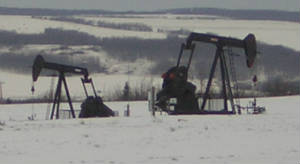
In northeastern BC, the “Landman” is a representative of an oil and gas company, who shows up at your door when the company wants to drill an oil or gas well on your property.
Unfortunately, you don’t have a lot of say in it. As we explained in our 2004 publication, When the Landman Comes Knocking, the law prioritizes the subsurface rights of the oil and gas companies, and leaves the land owner only with the right to be compensated for having an oil well on his or her property.
Indeed, even the cost of fighting about how much compensation you should pay has been a David versus Goliath battle, with land owners often outgunned (or at least out-lawyered) when appearing before the government’s Surface Rights Board.

“Costs” refers to legal fees that a losing party is required pay to the winning party in a court case. “Advance costs” – which the courts have begun to consider in a narrow range of cases – involves ordering one party to pay a portion of the other side’s legal fees before anyone has won or lost. Needless to say, “advance costs” have only been used in a small number of cases of considerable public importance, and subject to a test that the Supreme Court of Canada set out in the Little Sisters case (at para. 37).
But in 2010 the BC Legislature amended the law to explicitly give the Surface Rights Board the authority to give advance costs awards in proceedings before it.
In the Kerr decision, the Surface Rights Board exercises that power for the first time, and creates a new legal test for doing so. The Board reasoned that the Legislature, in giving it the power to make advance costs orders, must not have intended it to adopt the restrictive test used by the courts (para. 18).
The Board explained:
An entry order is a compulsory taking. While a landowner is entitled to be compensated, in the absence of an agreement with the operator, the landowner has no choice but to engage in the Board’s processes to advance a claim. … A landowner is disadvantaged in the absence of effective legal assistance with advancing the evidence and arguments to support alleged loss or damage. …
In this context, the intent of the Legislature in enacting section 169 must have been to give the Board a tool to ensure that both sides of a dispute before it would be able to effectively participate in its processes and have the ability to engage the professional resources necessary to advance the evidence and legal arguments necessary to support a claim.
The Surface Rights Board did not attempt to give an exhaustive list of the relevant factors in making this type of advance costs award, but did state that in this case, the relevant factors included (my adaptation and paraphrase):
- The compulsory nature of the application;
- Mr. Kerr’s personal and financial circumstances;
- The fact that Mr. Kerr wished to advance novel arguments;
- The apparent need for expert evidence to assist his case;
- Mr. Kerr had not received a costs award arising from the Board’s mediation process; and
- There was no suggestion that an advance award would pose an unfair burden on Canadian Natural Resources Ltd.
On the basis of those factors, the Board concluded:
The estimated costs for Mr. Kerr’s participation in the arbitration for counsel fees, expert witnesses, disbursements and taxes, all of which are contemplated in the definition of “actual costs” are not unreasonable and do not account for costs of the mediation process already incurred. I find the Board should exercise its discretion and grant an award of advance costs in the amount of $40,320.00.
The possibility of an advance costs award does not level the playing field between large oil and gas companies and individual land owners. The focus is still on the amount of compensation, and not on where well drilling should take place, and how close to residences, environmentally sensitive areas, etc.
That being said, this is clearly an option that land owners involved in compensation disputes, and their lawyers, need to be aware of. And we hope that it will result in better representation for affected land owners.
